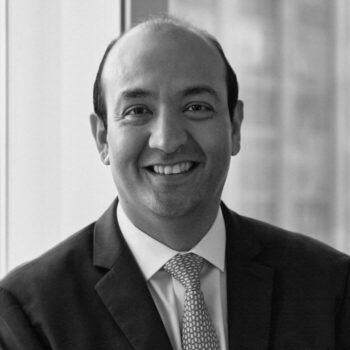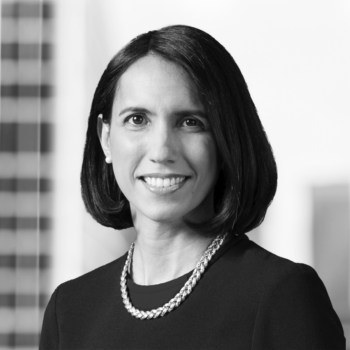| Ariel Global (Gross) | |
|---|---|
| Inception Date | December 31, 2011 |
| Assets (as of 03/31/2025) | $1.7 billion* |
Our Portfolio Managers

Executive Vice President

Senior Vice President, Head of Investments, Global Equities

Senior Vice President, Global Equities
We embrace
Active patience
Long investment horizon
Discernable catalysts
Lower turnover
Independent thinking
Non-consensus perspective
Benchmark agnostic
Inefficiency equals opportunity
Focused expertise
Deep domain knowledge
Forward-looking projections
Bottom-up stock selection
Bold teamwork
Dissent Encouraged
Collective experience leveraged
Aligned incentives
We reject
Short termism
Risk on/risk off investing
Value traps
Trading mentality
Group think
Conventional wisdom
Closet indexing
Collecting information
Thematic investing
Novice practitioners
Backward-looking research
Top-down portfolios
Individualism
Siloed decision-making
Smartest in the room mentality
Winner takes all
Sector Weightings
| (as of 03/31/2025) | ||||||||
| (as of 03/31/2025) | Ending Weight (%) | MSCI ACWI Net Index (%) | ||||||
|---|---|---|---|---|---|---|---|---|
| Financials | Ending Weight (%) 25.69 |
MSCI ACWI Net Index (%) 18.06 |
||||||
| Information Technology | Ending Weight (%) 16.16 |
MSCI ACWI Net Index (%) 23.37 |
||||||
| Consumer Discretionary | Ending Weight (%) 15.89 |
MSCI ACWI Net Index (%) 10.64 |
||||||
| Health Care | Ending Weight (%) 14.02 |
MSCI ACWI Net Index (%) 10.32 |
||||||
| Communication Services | Ending Weight (%) 8.33 |
MSCI ACWI Net Index (%) 8.16 |
||||||
| Industrials | Ending Weight (%) 7.83 |
MSCI ACWI Net Index (%) 10.57 |
||||||
| Utilities | Ending Weight (%) 6.89 |
MSCI ACWI Net Index (%) 2.69 |
||||||
| Consumer Staples | Ending Weight (%) 3.56 |
MSCI ACWI Net Index (%) 6.29 |
||||||
| Real Estate | Ending Weight (%) 1.75 |
MSCI ACWI Net Index (%) 2.12 |
||||||
| Funds | Ending Weight (%) 0.41 |
MSCI ACWI Net Index (%) 0.00 |
||||||
| Energy | Ending Weight (%) 0.00 |
MSCI ACWI Net Index (%) 4.16 |
||||||
| Materials | Ending Weight (%) 0.00 |
MSCI ACWI Net Index (%) 3.63 |
||||||
| Cash | Ending Weight (%) -0.52 |
MSCI ACWI Net Index (%) 0.00 |
||||||
Disclosures related to the data above can be found at the bottom of this page. |
||||||||
The following disclosures provide definitions relevant to the Key Facts / General Information about this Product, its Performance tables, Top 10 Positions tables, and Industry or Sector Weightings data tables shown above.
Ariel Investments, LLC (Ariel) is a Delaware limited liability company and federally registered investment adviser regulated by the U.S. Securities and Exchange Commission. Ariel is headquartered in Chicago, Illinois, with offices in New York, and San Francisco. Ariel offers investment strategies that seek long-term capital appreciation by investing primarily in equity securities. Ariel utilizes a bottom-up, fundamental analysis to select quality company stocks. Taking a long-term view and applying independent thinking to our investment decisions, Ariel spans the market cap spectrum from small to large and covers the globe with international and global offerings. Ariel claims compliance with the Global Investment Performance Standards (GIPS®). GIPS® is a registered trademark of CFA Institute. CFA Institute does not endorse or promote this organization, nor does it warrant the accuracy or quality of the content contained herein.
*Total strategy assets include all accounts and investment funds employing the strategy. All other information presented is for the Ariel Global Composite and its representative account.
The Ariel global strategy seeks long-term capital appreciation as a primary objective. The strategy’s secondary objectives are to seek long-term capital preservation, to generate attractive absolute and risk-adjusted returns, and to attain higher relative returns compared to its benchmark over a full market cycle. The strategy invests primarily in equity securities of both U.S. and foreign (non-U.S.) companies, including companies in developed or emerging markets. The strategy will invest in foreign securities by purchasing equity securities directly or through instruments that provide exposure to foreign companies. The strategy is permitted to invest in companies of any size, but typically will not invest in companies with market capitalizations below $1 billion. The Ariel Global Composite differs from its benchmark, the MSCI ACWI (All Country World Index) Index, because the Composite has fewer holdings than the benchmark.
The strategy uses various techniques to hedge currency exposure, or to invest significant cash inflows in the market (i.e., reducing “cash drag”), including derivatives, exchange-traded funds (“ETFs”), and other hedges. The strategy will buy and sell currency on a spot basis and enter into foreign currency forward contracts. Ariel uses these techniques primarily in an attempt to reduce unintended tracking error versus its benchmark, decrease the strategy’s exposure to changing security prices or foreign currency risk, or address other factors that affect security values. The strategy will at times include the holding of cash or cash equivalents for defensive purposes.
Ariel Composite Net of Fees returns are calculated by deducting: (1) for the period from inception to December 31, 2013, the maximum advisory fee in effect for the respective period, applied on a monthly basis; and (2) for the period from January 1, 2014 onwards, the actual monthly advisory fee (on an asset-weighted basis) accrued for the accounts in the composite, using the fee rates in place as of the most recent calendar quarter-end. Gross returns do not reflect the deduction of advisory fees. Client returns will be reduced by advisory fees and such other expenses as may be incurred in the management of the account. Advisory fees are described in Part 2 of Ariel’s Form ADV. Results shown may be preliminary. Returns are calculated in U.S. dollars. A copy of the examination report is available upon request. Past performance does not guarantee future results. Investments in foreign securities may underperform and may be more volatile because of the risks involving foreign economies and markets, foreign political systems, foreign regulatory standards, foreign currencies and taxes. The use of currency derivatives, ETFs, and other hedges may increase investment losses and expenses and create more volatility. Investments in emerging markets present additional risks, such as difficulties in selling on a timely basis and at an acceptable price. The intrinsic value of the stocks in which the portfolio invests may never be recognized by the broader market. The portfolio is often concentrated in fewer sectors than its benchmarks, and its performance may suffer if these sectors underperform the overall stock market. Investing in equity stocks is risky and subject to the volatility of the markets.
The Ariel Global Composite has been examined for the period from January 1, 2012 through December 31, 2023. Click here to obtain a GIPS Report.
Indexes are unmanaged. An investor cannot invest directly in an index.
The MSCI ACWI (All Country World Index) Index is an equity index of large and mid-cap representation across 23 Developed Markets (DM) and 24 Emerging Markets (EM) countries. Its inception date is January 1, 2001.
The MSCI ACWI Value Index captures large and mid-cap securities exhibiting overall value style characteristics across 23 Developed Markets countries and 24 Emerging Markets (EM) countries. Its inception date is December 8, 1997.
All MSCI Index net returns reflect the reinvestment of income and other earnings, including the dividends net of the maximum withholding tax applicable to non-resident institutional investors that do not benefit from double taxation treaties. MSCI uses the maximum tax rate applicable to institutional investors, as determined by the companies’ country of incorporation. MSCI makes no express or implied warranties or representations and shall have no liability whatsoever with respect to any MSCI data contained herein. The MSCI data may not be further redistributed or used to create indices or financial products. This report is not approved or produced by MSCI.
The sectors shown for the Global strategies are the Global Industry Classification Standard (“GICS”). GICS was developed by and is the exclusive property and service mark of MSCI Inc. and Standard & Poor’s (S&P), a division of The McGraw Hill Companies, Inc. GICS is licensed for use by Ariel Investments, LLC. Neither MSCI, S&P nor any third party involved in making or compiling GICS or any GICS classifications makes any express or implied warranties or representations with respect to such standard or classification (or the results to be obtained by the use thereof), and all such parties hereby expressly disclaim all warranties of originality, accuracy, completeness, merchantability and fitness for a particular purpose with respect to any such standard or classification. Without limiting any of the foregoing, in no event shall MSCI, S&P, any of their affiliates or any third party involved in making or compiling the GICS or any GICS classifications have any liability for any direct, indirect, special, punitive, consequential or any other damages (including lost profits) even if notified of the possibility of such damages.
Ending Weight is the value of the holding relative to the portfolio’s total assets as of the report date. Cash weight may include currency forwards net unrealized gain/loss.



